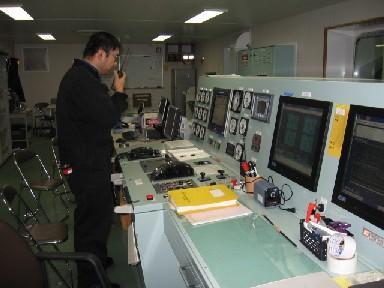

Home page|||
LNG handling |||
LPG handling||| Other Gas products|||
Fire & Safety|||
Emergency response |||
Loss of power supplies - emergency procedure for gas carriers
Loss of Power Supplies (including Emergency Power Supply)
Stop cargo operations. ESDS will be activated.
Inform the Master
Advise Terminal
Disconnect loading arms, if necessary. PERC. Consider - there are no means of controlling the moorings and, therefore, the vessel may move.
Monitor Tank pressure, consider - the possibility of venting
Evaluate situation (keeping in mind weather forecast for next few hours, proximity to shore) in order to determine the need for external assistance (Tugs).
Consider - leaving the berth
Consider - anchoring (inside port limits we will most probably be requested to have tug stand-by)
Hoist/exhibit signals: NUC (Not Under Command)
Use emergency radio to broadcast a warning to ships in the vicinity. Advise local Authorities (for example, VTIS if in Singapore strait)
Consider - emergency towing, make it ready
When Power has been Re-stored
Cancel warning to ships in the vicinity
Check gyro and steering device
Check navigation equipment
Check machinery
Check cargo equipment
Check all alarms
When power is restored, cancel the broadcast warning
Cancel external assistance if required (tugs)
Advise Terminal
Advise all parties concerned

Fig:Analyzing and reporting from control room the high level alarm
Related Information:
-
Preventive measures against spillage of low temperature cargo in Liquefied gas carrier
- Low Temperature Effects in gas carrier - Causes of Brittle Fracture & contermeasures
- How to cool down cargo system - a brief guide to Liquefied gas carrier
- Low Cargo Temperature Effects -What is rollover of Liquefied gas cargo ?
- Transporting economically viable compressed gas liquids from remote fields
- Increased Cargo Capacity for LNG ships & Advantages of the dual fuel diesel electric propulsion
Cargo tank ruptures due to increased pressure - emergency procedure for gas carriers
Risk and hazards of Equipment failure
Loss of Instrumentation during Unloading Operations - Recommended actions by Liquefied Gas carriers
Risk and hazards of Nitrogen Loss
Gas carriers Loss of Instrumentation during Loading Operations
Gas carriers Structural Damage due to Incorrect Loading/Unloading Sequence
Encountering High Winds and/or Waves - countermeasures
Safety guideline for changing previous cargo

// Home page///
LNG handling ///
LPG handling///
Sea transport ///
Gas products///
Cargo work
///Fire precautions
///Health hazards
///Safety Precautions
///Emergency response ///

Copyright © Liquefied Gas Carrie.com All rights reserved.
The content published in this website are for general reference only. We have endeavoured to make the information
as accurate as possible but cannot take responsibility for any errors. For latest information please visit www.imo.org .
Any suggestions, please Contact us !
///Links &Resources //
Terms of use///
Privacy policy///Home page///
